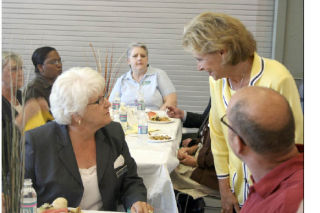Gov. Christine Gregoire pulled into the driveway in a jet-black SUV Sunday, turning one Oak Harbor beach-side community into a temporary Democratic hotspot.
By 3 p.m. on Bonnie View Acres Road, Trudy Sundberg’s living room was brimming with local politicians, senators and Democratic party members.
“Recently, I got in touch with the governor’s campaign and asked if she wanted to come to the island,” Sundberg, vice-chair of the Island County Democrats, said.
Gregoire replied “sure,” and made additional visits to Coupeville and Langley before leaving for eastern Washington.
In Sundberg’s home office, Gregoire sat down for an exclusive interview with the Whidbey News-Times to offer thoughts on the economy, transportation, the environment and other issues important to Whidbey Island.
One topic on the minds of local residents is the ferry system. In November, the state’s oldest ferries were pulled from service, amid concerns over cracks, leaks and corrosion. Money is set aside to replace the retired Keystone ferry but Gregoire calls for greater accountability in the future. Not only is the ferry service for transportation purposes, part of Whidbey Island’s economic development is tourism, she said.
“I will probably spend more time talking about the ferry issues here and ferry-related service and what we’re trying to accomplish after years of neglect to really modernize our ferry fleet and to have a business plan that takes us well out into the future,” she said.
“To make sure we’re not thinking that the only way to fund the ferry system is to go to the fare, the fare box. That’s not going to work. We’ve got to find an alternative, stable, long-term funding source not only to retire vessels when they age but to improve terminals and so on.”
Although the Department of Transportation estimates a future deficit, the newly commissioned ferries will not be affected. But over the span of 16 years, Gregoire said some projects will be put on hold. The budget is coming up short.
“We won’t scratch them off or not do them, all we’re going to have to say is that we’ll delay them for a while. Because people are getting out of their cars, candidly because of the high price of gas so there’s not enough revenue coming in. It’s happening nationally and in the state as well.” The state depends on the gas tax for much of its transportation funding.
Nationwide, experts say the economy is slowing. Economist.com reports that after the bursting of the housing bubble, overall GDP growth has fallen back sharply. Gregoire said Washington’s economy is resilient because of its diversity and increasing exports which have doubled since December. She added, however, we are not an island as a state and the national economy is starting to impact us.
“While we’re still 49th in foreclosures we can see that based on our receipts last month that housing is down. People can’t get credit,” Gregoire said. “And that’s the national economy that’s having that devastating impact. So we’re going to have to tighten our belts, there’s no question in my mind, because the national economy is not turning around. “The package that was put together to spur the economy did not seem to make much of a dent at all. So we need some national leadership to get their arms around the housing crisis, put Americans back to work, get our arms around fuel costs and allow us to begin recovery from this terrible economic downturn.”
Fuel costs are currently $4.14 a gallon, according to auto club AAA, and Gregoire believes the solution is alternative fuel sources. She recently joined Gov. Arnold Schwarzenegger (R-California) and Gov. Ted Kulongoski (D-Oregon) in denouncing President Bush’s decision to lift the ban on offshore drilling, because of its detriment to the environment. The White House told CBS News that Bush was trying to ease market tensions and boost supply. Gregoire called this a short-term and short-sighted solution.
If something like the 1989 Exxon Valdez oil spill happened in the Puget Sound, the area would not be able to recover, she said. The oil tanker spilled 10.8 million U.S. gallons into Alaska’s sea.
Gregoire said the state must focus on weaning itself away from using fossil fuels. So far, a few projects are in effect.
“We weren’t on anybody’s radar screen when it comes to wind and solar and we are now number three in the country, in terms of wind and solar power production. We have the largest (ethanol) refinery in the country in Hoquiam. The largest manufacturer of silicon panels is in Moses Lake. You can see we’re doing a lot. We have portfolio standards for all our PUD’s that they have to have a certain amount that’s renewable, we’re getting tax incentives. To me that’s what we need to be doing. Looking at the electric car; we as a state, in terms of our state motor pool are number one in the country for alternative flex fuel vehicles. That’s what we need to be doing everywhere in the state, is looking for new ways; a clean, green economy for our state,” Gregoire said.
To see video of Gregoire’s speech in the Coupeville High School Commons Monday, visit www.whidbeynewstimes.com.



